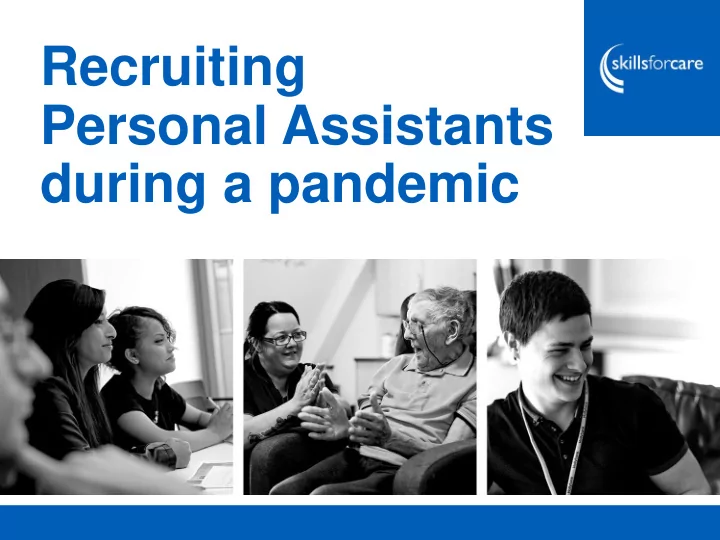

Recruiting Personal Assistants during a pandemic
Welcome ▪ this webinar is being recorded for others to watch ▪ attendees are on mute ▪ please do chat, comment and ask questions via the ‘Questions’ function. This is monitored by facilitators ▪ we will also be answering some questions sent in prior to the webinar ▪ there may be questions that come up during the session which we will have to park and check ▪ it will last no longer than one hour.
Presenters Shirley Way Fran Simons Locality Manager (Midlands) Locality Manager (Eastern)
Challenges to recruitment and retention during the pandemic ▪ over the last six months what has been the main challenge for you around the recruitment of PAs? ▪ over the last six months what has been the main challenge for you around the retention of PAs?
Current challenge To attract, develop and retain a quality Personal Assistant workforce. Challenges ▪ too many applicants without the right qualities ▪ not enough applicants ▪ can recruit OK but a high proportion of leavers. COVID 19 challenges: ▪ shielding ▪ family / carers undertaking PA role - sustainable? ▪ risk adverse PAs ▪ Distancing
What we’ll be covering ▪ who am I looking for? ▪ where will I find them? ▪ how can I reach them? ▪ tips for virtual recruitment ▪ local examples ▪ skills for Care resources ▪ Q & A
Who am I looking for? Who Employment type Motivation Recent leavers/ Temp/perm Give back to retirees/redundant staff community/career change Dom care staff Temporary Maintain earnings Furloughed staff Temporary Wage top up Self-employed Temporary Supplement income students Temp / perm Early way in to the sector Recently inspired Temp / perm Want to help/ feel useful
Where will I find them? ▪ national and local recruitment initiatives ▪ use of support organisations ▪ local community/volunteer scheme ▪ PA registers www.skillsforcare.org.uk/iepahub ▪ careers and employment advisors ▪ link with other service sectors (e.g. hospitality) ▪ colleges and universities ▪ recruitment agencies.
Channels POLL What channels have you used for recruitment pre and during COVID? ▪ social media (including website) ▪ local community via printer promotion e.g. posters/flyers/local newspaper ▪ online jobs boards ▪ recruitment fairs and events ▪ other
Key messages Impactful language: ▪ assume no knowledge ▪ tap into motivations ▪ communicate the urgency ▪ state how much their support will be valued. Rewards, benefits and addressing concerns: ▪ communicate benefits ▪ promote support they will receive from you ▪ address COVID fears and concerns.
National Care to make a difference www.findajob.dwp.gov.uk/ https://www.joinsocialcare.co.uk/
Local examples 1. Support with Confidence www.supportwithconfidence.gov.uk/ 2. Coventry City Council Independent Living Team. 3. The Disability Resource Centre Case study 'J' Care Pair.
Distance recruitment Tips for selecting a PA using virtual methods: Poll: Have you ever conducted a virtual interview? ▪ Yes ▪ No
Technology and data Choosing the right technology ▪ what is available? ▪ what do you need to use the technology for? www.skillsforcare.org.uk/SafeAndRapid Keeping data safe ▪ The National Cyber Security Centre have some good resources www.ncsc.gov.uk/collection/small-business-guide/video
Planning virtual interviews ▪ help the applicant prepare – it is likely to be a new experience for them ▪ choose a quiet area for the interview ▪ ensure you have all the information to hand ▪ if you’re interviewing with another person, discuss who will be asking what questions, and who will take notes. And remember that all important practice run!
During the interview ▪ welcome and check the tech ▪ shut down other applications on your device ▪ use a values-based approach ▪ include the A Question of Care report if you have asked the applicant to undertake the online quiz. ▪ right to work checks can be completed on video calls www.gov.uk/guidance/coronavirus-covid-19-right-to-work-checks ▪ give the applicant plenty of time to respond to questions ▪ build in plenty of time for the applicant to ask their own questions ▪ always end the interview by detailing how you will follow up.
Tips: ▪ treat it like any other interview ▪ have a back-up in case the technology fails ▪ dress professionally ▪ mute your microphone when the candidate is speaking.
Local examples ▪ Penderels Trust: Case study 'P' Sheffield ▪ See the handouts for more examples
Skills for Care Resources Recruiting Personal assistants (PAs) ▪ Employing personal assistants toolkit: www.employingpersonalassistants.co.uk ▪ Working as a PA: www.skillsforcare.org.uk/iepahub
Employing personal assistants toolkit This toolkit includes information about: ▪ recruiting a personal assistant ▪ before your personal assistant starts ▪ managing your personal assistant ▪ training and qualifications ▪ sorting our problems ▪ templates. Email marketing@skillsforcare.org.uk for a free printed copy or visit www.skillsforcare.org.uk/PAtoolkit
Supporting PA recruitment Recruitment models and guides Using a sector based work academy approach for recruiting PAs ▪ Our online guide shares best practice from the pilots, and provides a step by step process that supporting organisations can follow to set up and run an academy. www.skillsforcare.org.uk/SBWAforPAs Case studies using different ways to promote the PA role and support recruitment ▪ Disability Sheffield CIL, My Life Pathways to Employment, Nottinghamshire CC support with confidence, SHIP Transforming Care Partnership promoting the PA role to students.
Information hub Employers, PAs and supporting organisations ▪ link to A Question of Care ▪ being a PA guide ▪ links to videos about being an employer and PA ▪ practical guides to support learning and development ▪ understanding the employment status of PAs. www.skillsforcare.org.uk/iepahub
▪ Intelligence about the workforce - IEs and PAs report www.skillsforcare.org.uk/adult- social-care-workforce-data/Workforce- intelligence/publications/Topics/Individual- employers-and-personal-assistants.aspx ▪ Local support from our network of locality managers www.skillsforcare.org.uk/inyourarea ▪ Local networking events and information webinars – sign up to our newsletter to find out more about what’s coming up www.skillsforcare.org.uk/events
Funding for training Support the development of both employers and PAs Individual employer funding: ▪ pay for the cost of training, travel and replacement PAs www.skillsforcare.org.uk/iefunding ULO funding: ▪ awarded to organisations to arrange training www.skillsforcare.org.uk/ulofunding COVID-19 essential training: www.skillsforcare.org.uk/essentialtraining
Thank you for taking part in this webinar Any Questions?
Recommend
More recommend